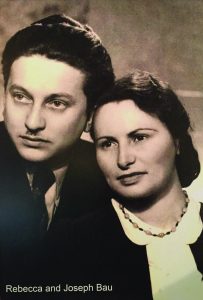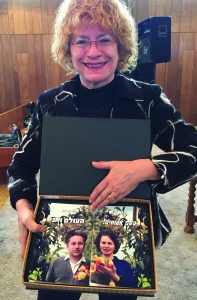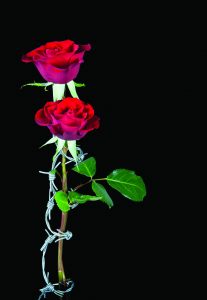
by: Kathy DeGagne, BFP Staff Writer

Rebecca and Joseph Bau (Photo Credit: Courtesy of Clila Bau)
A petite, Israeli woman named Clila Bau-Cohen is telling us the story of her parents, Joseph and Rebecca Bau. Her accented English is animated and frequently tinged with delight as her parents’ story unfolds.
This is a love story—with all the joy and optimism that embodies true love. But the romance between Joseph and Rebecca is no conventional love story, for it bloomed within the grim confines of a Nazi concentration camp. Painful threads weave their way through its telling, but ultimately the picture that emerges is one of hope, triumph and beauty.
Clila points to a photograph of the handsome couple taken during their second wedding ceremony, for their first ceremony lacked a photographer, bridesmaids, a bridal gown and even a rabbi.
Hundreds of guests gathered to witness the wedding of Rebecca and Joseph, but it wasn’t an ordinary wedding and these weren’t ordinary guests. They were the inmates of Barracks 13, the women’s barracks of Plaszow Concentration Camp in Poland. At one end of the crowded room, three people stood in the glare of a single lightbulb, all dressed in striped camp garb—Joseph, disguised as a woman so he could sneak into the barracks, his bride Rebecca and Joseph’s mother who blessed the couple in the absence of a rabbi. On Rebecca’s finger, Joseph placed a ring fashioned from a silver spoon for which he’d paid four precious loaves of bread.
The wedding had barely ended when the SS arrived to comb the camp for men who had snuck into the women’s barracks. Two hapless young men were discovered and beaten to death. But Joseph remained undetected. He lay on a top bunk covered with a pile of rags and, for many terrifying moments, served as a quaking pillow for his wife and her two neighbors.
Suddenly, the siren sounded to muster all the men. Joseph ran out the door but realized that the gates were closed. The only way out was over the electrified fence. He grieved that his new bride would be a widow before their marriage had barely begun. But with a flying leap, he cleared the fence with his toes just grazing the top. The electricity hummed, but he felt nothing and landed on the other side still very much alive. He later wrote, “To this day I cannot understand how I managed to cheat that dragon that spit fire.”
The couple first met when Joseph was vainly trying to make a construction blueprint for the camp commandant, the infamous Amon Goeth. The print had to be exposed to the sun’s rays, but on that overcast day, Joseph knew the process would take a miracle—and a bullet at the hands of Goeth if he was unsuccessful. Just then, an attractive girl came out of the office and asked what he was doing. He replied, “I’m waiting for the reluctant sun to come out. Could you perhaps take its place?” Miraculously, the blueprint developed, and Joseph knew he had found his life’s sunshine. They met clandestinely behind the latrines and, in a series of miracles, were never caught.

Clila Bau-Cohen with her parents’ books presented side by side as a boxed set. (Photo credit: Courtesy of Patty Nelson.)
Rebecca was a nurse and beautician—and a spy. Rebecca discovered that a list was being drawn up to allow Plaszow inmates to work in Oskar Schindler’s factory, their last hope for survival. When she found out her name was on it, she had it erased and her husband’s name inserted instead. Joseph didn’t know that Rebecca had saved his life at the possible cost of her own. He only discovered it fifty years later when their story was immortalized in the movie, Schindler’s List.
Rebecca was shipped to Auschwitz, but her skill as a nurse and her ability to speak nine languages helped her survive and save many others. She kept her heroic exploits a secret until well after the war when her daughters discovered the diaries that recorded those events.
Joseph meanwhile used his creative skill as a graphic artist to forge documents for hundreds of Jewish concentration camp inmates. He was once asked why he didn’t save himself by forging his own documents. He replied simply, “Then who would save the others?”
After the war, Joseph and Rebecca miraculously found one another and immigrated to Israel. Joseph worked in the graphics profession that had served him so well in the camp. He opened a studio in Tel Aviv and there recorded his experiences in the Holocaust through artwork and verse—stark images with penetrating insight into the human psyche. He manufactured his own movie projector from a sewing machine and became Israel’s first animator, “The Walt Disney of Israel.”
He also secretly worked as the chief forger for the Mossad. His family remained unaware of his secret life until Clila recalled her father blanching when he heard about the arrest of famous Mossad agent, Eli Cohen, fearing—needlessly—that mistakes in his forging work had betrayed Cohen into Syrian hands.

Photo credit: Anneka/shutterstock.com
Both Rebecca and Joseph wrote about their love story in separate autobiographies—but the stories are meant to go together for their lives were a romantic dialogue that lasted decades. The books tell the story of their love for one another, bringing a breath of hope and expectation to the nascent Jewish state, and the courage of the Jewish people in the face of incredible odds. As a memoir of miracles, Joseph and Rebecca’s story quietly symbolizes the triumph of love over hate and the beauty that arose from the ashes of the Holocaust—a miracle that surpassed all the others.
A museum dedicated to Joseph and Rebecca Bau can be found at the Joseph Bau House, 9 Berdichevsky St. Tel Aviv. (www.josephbau.com)
All logos and trademarks in this site are property of their respective owner. All other materials are property of Bridges for Peace. Copyright © 2025.
Website Site Design by J-Town Internet Services Ltd. - Based in Jerusalem and Serving the World.